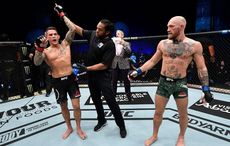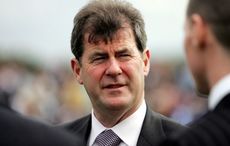Since the Republic of Ireland were outclassed by Spain at Euro 2012, comprehensively beaten by four goals, the always contentious Roy Keane has been openly speaking his mind about the Irish attitude.
Keane, as part of ITV's coverage of the tournament, initially said "I think the players, and even the supporters, they all need to change their mentality. It's just nonsense from players speaking after the games about how great the supporters are. The supporters want to see the team doing a lot better and not giving daft goals away like that...I'm not too happy with all that nonsense. Let's change that attitude towards Irish support as well...They want to see the team winning as well, let's not kid ourselves. I know we're a small country and we're up against it, but let's not just go along for the sing-song every now and again."
Since then, he has followed up his initial sentiments in typical Keane fashion by not backing down.
Just like the infamous Saipan incident of a decade ago, when Keane was part of the squad not the coverage team, a nation has become divided once again. It may not be as big an issue as Keane's dismissal from the squad was 10 years ago, but it has brought to light an important debate regarding the Irish team and the setup of the Irish system itself.
It is easy to react to Keane's comments emotionally, but if you take his comments objectively, it cannot be denied that Keane has a point.
You can agree with Keane's sentiment without fully accepting everything that he says. Was Keane overly critical of a fanbase that genuinely was just happy to be there? Maybe so. Was he harsh on the players when he called them out for essentially lacking the passion that permeated through his play? Not so much.
Ireland did enter this tournament as the smallest nation, according to Miguel Delaney, but only slightly behind Croatia. Soccer isn't close to being the number one sport in a country dominated by the GAA also, so tempered expectations are somewhat acceptable.
However, there is a difference between tempered expectations and making up the numbers. The truth is Ireland did go and just make up the numbers at this tournament even after Robbie Keane said that that was exactly the thing they were not doing. They may have a small population, and as Delaney also points out, a poorly set up infrastructure, but Ireland's quality of players in this squad was not far behind, possibly even better than, the Czech Republic and Greek squads who qualified from Group A.
Of course neither of those teams had to face as quality opposition as Croatia, Spain and Italy, but Poland and Russia, the other two teams in Group A, were no slouches. The Czech team and, in particular, the Greece team relied on a competitive desire and passion to play for their country to reach the knockout phases of the competition.
Ireland's players did not show that same passion when they opened the tournament against Croatia. They may have been outclassed by Spain, but save for a few players most notably Keith Andrews, there was little belief in the side during that game either. This is where Keane's comments are fitting.
As a player, Keane never settled for second.
On the field he was a leading star for Manchester United and the consensus best player for his country. In fact, Keane's dismissal from the World Cup Squad in 2002 was because he felt Ireland were being treated as second class with their training setup.
Keane wasn't a limited player, he had endless talent. Ireland may have some limited players in their squad right now, but accepting that you are limited and settling for that level of play is why those players are limited in the first place.
Across all sports your mentality and approach is just as important as your physical abilities.
Eli Manning, the quarterback of the New York Giants, declared himself as one of the best players in the league last year entering the season. The average fan laughed at Manning and made jokes about him while most analysts disagreed with him.
By the end of the year, Manning had led his team to a victory in the Super Bowl and was the MVP of the game itself.
As far as talent goes, Manning is nowhere near the most talented player in the league. His confidence, belief and determination on the field however seeped through his team and led to phenomenal performances on the field.
The one thing all of the greats across every sport have in common is a belief and desire. The desire to be the best at what they do is what allows them to hone out their craft and outwork those with more talent than them. The recent documentary by NBA TV about the dream-team, the 1992 USA Olympic team that featured 11 hall-of-fame basketball players, revealed just how competitive each player was even during practices or rounds of golf.
The dream team had an abundance of talent that will never be matched across any sport, they make the current Spanish side seem average. Notably though, they never settled. Even as they were sweeping past teams by 40+ points, individual battles were taking place on each possession.
Toni Kukoc, the best European basketball player at the time, was singled out by Scottie Pippen during the USA's match against Croatia. Pippen's club, the Chicago Bulls, had drafted Kukoc and their general manager had high hopes for him. Pippen, and Bulls teammate Michael Jordan, wanted to send a message to Kukoc to reiterate who's team he was joining.
"We wanted to guard him on the bench" is how Pippen described their attitude towards Kukoc. Jordan and Pippen argued over who was going to guard Kukoc during the game. Eventually they split time facing off against the Croat and both ultimately made him irrelevant in a game that they were going to easily win regardless of how Kukoc played.
It's that ruthless attitude that wins Championships and creates great players.
The Irish attitude is great if you are a fan. Nobody was prouder than me when The Fields of Athenry was being sung during the final 10 minutes of Ireland's clash with Spain. Showing that kind of loyalty and appreciation of your team is great. It is what makes Sports special for fans.
It should feel horrible if you are a player however.
If Andres Iniesta or Xavi or even Alvaro Arbeloa had lost by four goals to Ireland, how would they feel? They would be disgusted and elevate their game in their next outing. That has nothing to do with talent or a lack of respect for Ireland, that has to do with the attitude of a champion.
Pride is one of the great qualities of the Irish people. Whether it be your local hurling side, your county football team, your rugby province or national soccer team, we always show pride both on and off of the field. This tournament we showed plenty of pride, but very little of that pride came from the players on the pitch.
You don't have to be a champion to have the attitude of one, but you do need to have that attitude to ever become one. Just because we are a smaller nation doesn't mean we should be treated or act any differently to bigger nations. If other nations looked down on us we'd be infuriated, if we look down on ourselves then that is acceptable?
Personally, it's not to me. Maybe it is to you, but I doubt it.
If you are a fan, celebrate the achievement. If you are a player, don't be happy to just make up the numbers.
Cian Fahey writes for the Guardian, Steelersdepot and FFBLife. You can follow him on twitter @Cianaf
Keane, as part of ITV's coverage of the tournament, initially said "I think the players, and even the supporters, they all need to change their mentality. It's just nonsense from players speaking after the games about how great the supporters are. The supporters want to see the team doing a lot better and not giving daft goals away like that...I'm not too happy with all that nonsense. Let's change that attitude towards Irish support as well...They want to see the team winning as well, let's not kid ourselves. I know we're a small country and we're up against it, but let's not just go along for the sing-song every now and again."
Since then, he has followed up his initial sentiments in typical Keane fashion by not backing down.
Just like the infamous Saipan incident of a decade ago, when Keane was part of the squad not the coverage team, a nation has become divided once again. It may not be as big an issue as Keane's dismissal from the squad was 10 years ago, but it has brought to light an important debate regarding the Irish team and the setup of the Irish system itself.
It is easy to react to Keane's comments emotionally, but if you take his comments objectively, it cannot be denied that Keane has a point.
You can agree with Keane's sentiment without fully accepting everything that he says. Was Keane overly critical of a fanbase that genuinely was just happy to be there? Maybe so. Was he harsh on the players when he called them out for essentially lacking the passion that permeated through his play? Not so much.
Ireland did enter this tournament as the smallest nation, according to Miguel Delaney, but only slightly behind Croatia. Soccer isn't close to being the number one sport in a country dominated by the GAA also, so tempered expectations are somewhat acceptable.
However, there is a difference between tempered expectations and making up the numbers. The truth is Ireland did go and just make up the numbers at this tournament even after Robbie Keane said that that was exactly the thing they were not doing. They may have a small population, and as Delaney also points out, a poorly set up infrastructure, but Ireland's quality of players in this squad was not far behind, possibly even better than, the Czech Republic and Greek squads who qualified from Group A.
Of course neither of those teams had to face as quality opposition as Croatia, Spain and Italy, but Poland and Russia, the other two teams in Group A, were no slouches. The Czech team and, in particular, the Greece team relied on a competitive desire and passion to play for their country to reach the knockout phases of the competition.
Ireland's players did not show that same passion when they opened the tournament against Croatia. They may have been outclassed by Spain, but save for a few players most notably Keith Andrews, there was little belief in the side during that game either. This is where Keane's comments are fitting.
As a player, Keane never settled for second.
On the field he was a leading star for Manchester United and the consensus best player for his country. In fact, Keane's dismissal from the World Cup Squad in 2002 was because he felt Ireland were being treated as second class with their training setup.
Keane wasn't a limited player, he had endless talent. Ireland may have some limited players in their squad right now, but accepting that you are limited and settling for that level of play is why those players are limited in the first place.
Across all sports your mentality and approach is just as important as your physical abilities.
Eli Manning, the quarterback of the New York Giants, declared himself as one of the best players in the league last year entering the season. The average fan laughed at Manning and made jokes about him while most analysts disagreed with him.
By the end of the year, Manning had led his team to a victory in the Super Bowl and was the MVP of the game itself.
As far as talent goes, Manning is nowhere near the most talented player in the league. His confidence, belief and determination on the field however seeped through his team and led to phenomenal performances on the field.
The one thing all of the greats across every sport have in common is a belief and desire. The desire to be the best at what they do is what allows them to hone out their craft and outwork those with more talent than them. The recent documentary by NBA TV about the dream-team, the 1992 USA Olympic team that featured 11 hall-of-fame basketball players, revealed just how competitive each player was even during practices or rounds of golf.
The dream team had an abundance of talent that will never be matched across any sport, they make the current Spanish side seem average. Notably though, they never settled. Even as they were sweeping past teams by 40+ points, individual battles were taking place on each possession.
Toni Kukoc, the best European basketball player at the time, was singled out by Scottie Pippen during the USA's match against Croatia. Pippen's club, the Chicago Bulls, had drafted Kukoc and their general manager had high hopes for him. Pippen, and Bulls teammate Michael Jordan, wanted to send a message to Kukoc to reiterate who's team he was joining.
"We wanted to guard him on the bench" is how Pippen described their attitude towards Kukoc. Jordan and Pippen argued over who was going to guard Kukoc during the game. Eventually they split time facing off against the Croat and both ultimately made him irrelevant in a game that they were going to easily win regardless of how Kukoc played.
It's that ruthless attitude that wins Championships and creates great players.
The Irish attitude is great if you are a fan. Nobody was prouder than me when The Fields of Athenry was being sung during the final 10 minutes of Ireland's clash with Spain. Showing that kind of loyalty and appreciation of your team is great. It is what makes Sports special for fans.
It should feel horrible if you are a player however.
If Andres Iniesta or Xavi or even Alvaro Arbeloa had lost by four goals to Ireland, how would they feel? They would be disgusted and elevate their game in their next outing. That has nothing to do with talent or a lack of respect for Ireland, that has to do with the attitude of a champion.
Pride is one of the great qualities of the Irish people. Whether it be your local hurling side, your county football team, your rugby province or national soccer team, we always show pride both on and off of the field. This tournament we showed plenty of pride, but very little of that pride came from the players on the pitch.
You don't have to be a champion to have the attitude of one, but you do need to have that attitude to ever become one. Just because we are a smaller nation doesn't mean we should be treated or act any differently to bigger nations. If other nations looked down on us we'd be infuriated, if we look down on ourselves then that is acceptable?
Personally, it's not to me. Maybe it is to you, but I doubt it.
If you are a fan, celebrate the achievement. If you are a player, don't be happy to just make up the numbers.
Cian Fahey writes for the Guardian, Steelersdepot and FFBLife. You can follow him on twitter @Cianaf




Comments